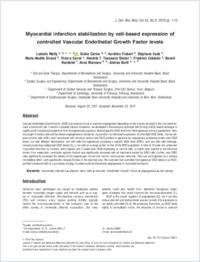Myocardial infarction stabilization by cell-based expression of controlled Vascular Endothelial Growth Factor levels
- Melly, Ludovic Cell and Gene Therapy, Departments of Biomedicine and Surgery, University and University Hospital Basel, Switzerland - Cardiac Surgery and Engineering, Departments of Biomedicine and Surgery, University and University Hospital Basel, Switzerland - Department of Cardiac Vascular and Thoracic Surgery, CHU UCL Namur, Yvoir, Belgium
- Cerino, Giulia Cardiac Surgery and Engineering, Departments of Biomedicine and Surgery, University and University Hospital Basel, Switzerland
- Frobert, Aurélien Department of Cardiology, University of Fribourg, Switzerland
- Cook, Stéphane Department of Cardiology, University of Fribourg, Switzerland
- Giraud, Marie-Noëlle Department of Cardiology, University of Fribourg, Switzerland
- Carrel, Thierry P. Department of Cardiovascular Surgery, Inselspital, Bern University Hospital and University of Bern, Switzerland
- Tevaearai Stahel, Hendrik T. Department of Cardiovascular Surgery, Inselspital, Bern University Hospital and University of Bern, Switzerland
- Eckstein, Friedrich Cardiac Surgery and Engineering, Departments of Biomedicine and Surgery, University and University Hospital Basel, Switzerland
- Rondelet, Benoît Department of Cardiac Vascular and Thoracic Surgery, CHU UCL Namur, Yvoir, Belgium
- Marsano, Anna Cardiac Surgery and Engineering, Departments of Biomedicine and Surgery, University and University Hospital Basel, Switzerland
- Banfi, Andrea Cell and Gene Therapy, Departments of Biomedicine and Surgery, University and University Hospital Basel, Switzerland
-
25.02.2018
Published in:
- Journal of Cellular and Molecular Medicine. - 2018, vol. 22, no. 5, p. 2580-2591
English
Vascular Endothelial Growth Factor (VEGF) can induce normal or aberrant angiogenesis depending on the amount secreted in the microenvironment around each cell. Towards a possible clinical translation, we developed a Fluorescence Activated Cell Sorting (FACS)‐based technique to rapidly purify transduced progenitors that homogeneously express a desired specific VEGF level from heterogeneous primary populations. Here, we sought to induce safe and functional angiogenesis in ischaemic myocardium by cell‐based expression of controlled VEGF levels. Human adipose stromal cells (ASC) were transduced with retroviral vectors and FACS purified to generate two populations producing similar total VEGF doses, but with different distributions: one with cells homogeneously producing a specific VEGF level (SPEC), and one with cells heterogeneously producing widespread VEGF levels (ALL), but with an average similar to that of the SPEC population. A total of 70 nude rats underwent myocardial infarction by coronary artery ligation and 2 weeks later VEGF‐expressing or control cells, or saline were injected at the infarction border. Four weeks later, ventricular ejection fraction was significantly worsened with all treatments except for SPEC cells. Further, only SPEC cells significantly increased the density of homogeneously normal and mature microvascular networks. This was accompanied by a positive remodelling effect, with significantly reduced fibrosis in the infarcted area. We conclude that controlled homogeneous VEGF delivery by FACS‐ purified transduced ASC is a promising strategy to achieve safe and functional angiogenesis in myocardial ischaemia.
- Faculty
- Faculté des sciences et de médecine
- Department
- Médecine 3ème année
- Language
-
- English
- Classification
- Biological sciences
- License
- License undefined
- Identifiers
-
- RERO DOC 309045
- DOI 10.1111/jcmm.13511
- Persistent URL
- https://folia.unifr.ch/unifr/documents/306512
Other files
Statistics
Document views: 50
File downloads:
- gir_mis.pdf: 121
- gir_mis_sm.pdf: 90

